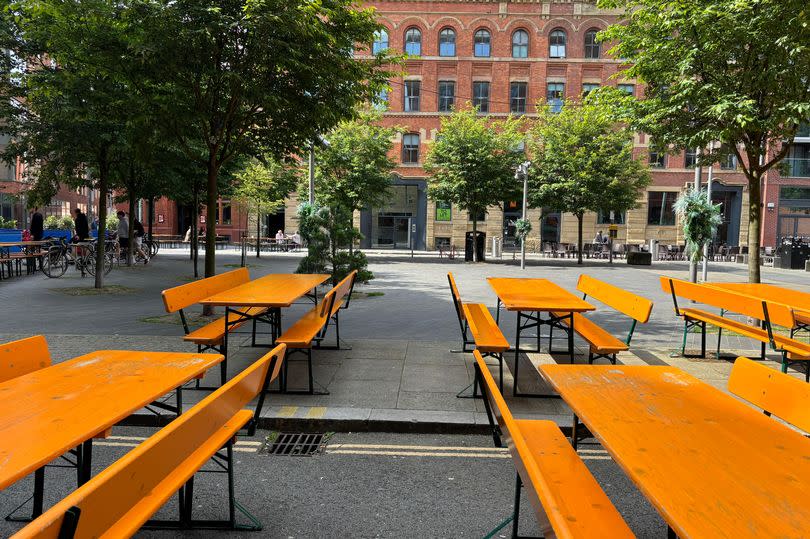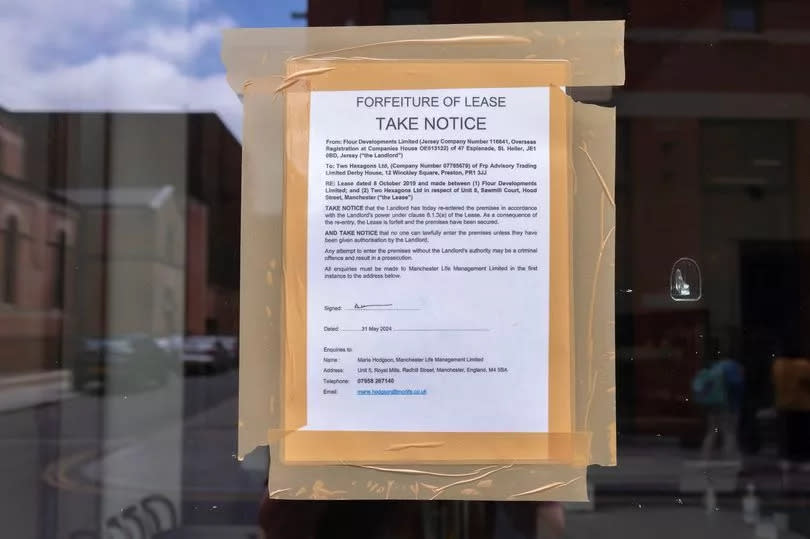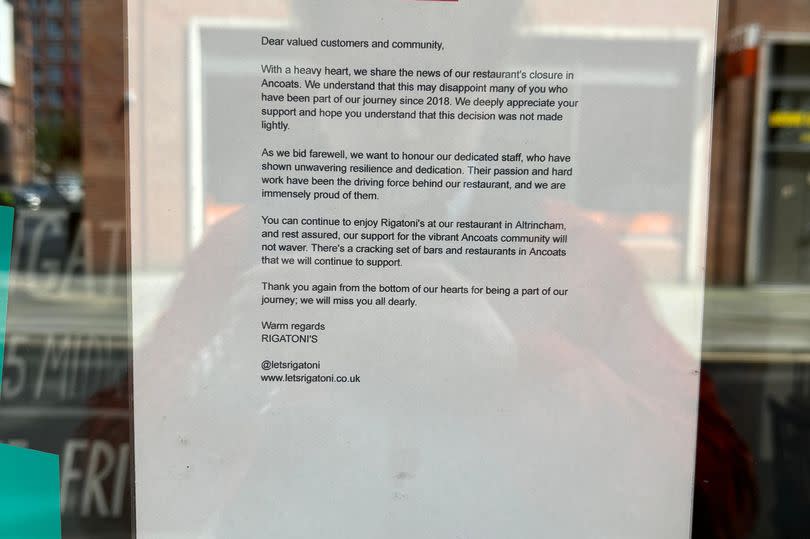It's one of the world's coolest neighbourhoods. So where is everybody?

The sun is shining on Cutting Room Square. It’s 4.30pm on a Thursday in June, with the Euros football tournament just around the corner.
And yet, in this square which was named ‘one of the world’s coolest streets’ 19 months ago, there are only 18 people enjoying a drink or meal across the bars, cafes, and restaurants on the street.
Those 18 only occupy five of the dozens of tables in the square. There used to be more tables.
Over the last 12 months, Ancoats has seen the Second City sports bar shut and its unit is still vacant. ‘Audiophile bar and kitchen’ Nam closed earlier this year - and its unit also remains unoccupied.
Last month was particularly hard for the neighbourhood. First, pasta bar Rigatoni’s announced on May 20 it would be closing down that week.
Then, on May 31, a forfeiture notice was posted on the door of artisan bakery Trove, which landlords Manchester Life said was issued after the cafe entered liquidation.
A Manchester Evening News investigation revealed Trove's parent company was in £1.6 million of debt.

Of course, it isn't just Ancoats where hospitality businesses are struggling. Traders have been open about the post-pandemic pressures that have seen long-standing businesses like Greens, in Didsbury close their doors, and the likes Pie and Ale in the Northern Quarter shuttered without warning.
February 22 was a particularly gruesome day for Greater Manchester’s hospitality scene, as three restaurants — Vurger and Canvas in the city centre and Zing and Zest in Oldham — confirmed they’d thrown in the towel. Shortly after that, the Campaign for Real Ale (CAMRA) published research showing 1,000 pubs closed in Britain in 2023, and our city-region saw 24 permanent closures and 60 long-term closures that year.
Nonetheless, Ancoats is unique in Manchester. It's celebrated as one of the 'coolest neighbourhoods in the world', as an example of how successful regeneration can create new, thriving communities and bring affluent, young professionals into the city. So are the problems typical of those across the hospitality sector - or is there more to it?
“The people who live here are secluded”
Ancoats has, since being redeveloped into its current form in the mid-2010s, been an incubator for independent traders. Rudy’s opened its first pizzeria here in 2015, and is now a nationwide chain.
Mana opened in 2018 just behind the Halle, and earned its first Michelin star a year later — the city’s first for 40 years. Restaurants Canto and Elnecot have also been mainstays of the area - indeed the only major chain with a presence in the area is the Co-op, which itself is a Greater Manchester icon.
New businesses continue to pop up here. But the way they operate is changing out of necessity, according to Warren Newell, one of the founders of New Orleans-inspired sandwichery Po-Boys.

Instead of opening their own venue, Po-Boys has taken over the kitchen of Seven Brothers to provide food for drinkers in the bar, after Warren ‘adapted our business model to vendoring’, as the practice is called in the industry.
That’s because ‘rent prices are high enough [in Ancoats] for us to never consider ever having our own place’, he explained, so they opt for smaller tie-ins with existing popular spots where trade is more predictable.
“This is our first venue, we will see how it goes here, and if it’s successful we would like to go to another Seven Brothers site depending on the economy and rent prices,” he went on, signalling that the vendoring strategy is one for the long-term, not just while Po-Boys is new.
But why is Ancoats difficult to set up shop in? “The people who live here are secluded,” he replied. “Those outside the bubble do not wander in.”
“Our limit would be £900… rent’s about four times that”
Added to the difficulty of attracting passing trade are the higher costs of operating in Ancoats. One business owner who does vendoring inside a bar and asked to stay anonymous, said he could afford a rent of £900 per month were he to set-up in a standalone shop.
“Rent is about four times that,” in Ancoats, a colleague suggested, to which the owner agreed. But rent at around £3,500 per month is not the only cost firms need to meet.
Nor are utilities, wages, or business rates. That’s because some leaseholders in this part of the city are subject to an additional ‘estate charge’.
That pays for an ‘Estate Management Company for the Ancoats estate’, according to a 2017 council report drawn up when the area was coming together.
It's a fee that supports the cleanliness, maintenance and landscaping of the area, and it's tied to inflation. Management use the retail price index in March to set the annual fee for the upcoming financial year in April.
Inflation hit 13.5 percent in March 2023, meaning the charge rose by the same amount for some businesses when other bills also went through the roof. This year, it it went up by another 4.3 percent.
So as other costs have risen, some now feel it is an added pressure they wouldn't face in other areas of the city. The business owner told us it makes it ‘harder for a small business to flourish here’, adding: “I think it’s easier to start up in the Northern Quarter than here, and actually stick there."
For its part, the council says 'the Ancoats estate charge is charged to both residents and businesses... to make sure the neighbourhood is clean and continues to receive the investment that makes its one of the most sought-after places to live and do business in the city'.
"However, it's important that we can do what we can to support businesses who are struggling and we would urge people to get in touch with the Council to discuss how we might be able to help," a spokesperson added.
Ultimately, Jasmine Smith, bar manager at Seven Brothers, thinks the costs will mean the area could lose some of its key ingredient - "neighbourhood feel"- admit rumours that chain businesses are eyeing Ancoats.
“We know a lot of people here,” she explained. “It’s quite special, so it would be a shame for that to dissipate, but it seems that will happen — because the only people who could afford it are moving in.”
“Last weekend was dead”
With or without the extra charges and sky-high rents, there’s also evidence that the area is just seeing reduced visitor numbers. It’s the case in Ancoats Coffee Co, located inside the Royal Mills by the Rochdale Canal, according to Robbie Candy, a supervisor.
“Over the last few months, it has been quieter compared to this time last year,” he said. “A lot seemed to coincide with the sunshine coming out and we are lacking in sun.”
Despite that, he doesn’t think the business is ‘struggling’. A similar story is present in the Edinburgh Castle, where Joe Wood is the manager.
“Our last weekend was dead,” he says.
The trend hasn’t been going on too long and there is a reasonable explanation for it, however: “It’s only been like this for about a month," he adds. "With the weather [Cutting Room] Square is chocked full, and with the end of the football season, we are getting a lot less people, but if the weather starts back up that will pick up again.”
Meanwhile, Joe has heard from friends in the hospitality scene — an ever-loquacious bunch — that there are 'shared problems between a lot of places’, both in and out of Ancoats.
“It’s just people not coming and spending money because they cannot with the cost of living crisis,” he summarised.
“I don’t think it’s Ancoats specifically”
“Rent prices are the thing,” agreed Anna Martin, a bar manager in Jimmy’s. It’s 3pm inside the rock bar and she is without any customers.
But she still believes that the area is buzzing: “I don’t think [closures are] an Ancoats problem specifically.
“It’s as lively as it’s ever been at the moment. I think it’s got busier. I think everyone comes to Ancoats, and it’s still known as the place everyone wants to be.”
Her view is shared by Chris Griffith, the co-owner of Cafe Cotton, inside the Halle. “I think it’s the general economic situation,” before going on to list the specific reasons why he believes Nam, Trove, Rigatoni's and Second City closed this year - all of which were 'wider than Ancoats', he says.
But he does accept that there are some unique challenges with being a business here. He went on: “Ancoats is a destination. There’s the Northern Quarter where you can walk through. Here you are stuck out on your own. We definitely have to make it a destination to go there.”
There remains the expectation that the area will bounce back with — with better weather, a summer of sport and gossip circulating about who is looking at new units in the area. But, for the time being, Ancoats is feeling a bit battered and bruised.

 Yahoo News
Yahoo News 
